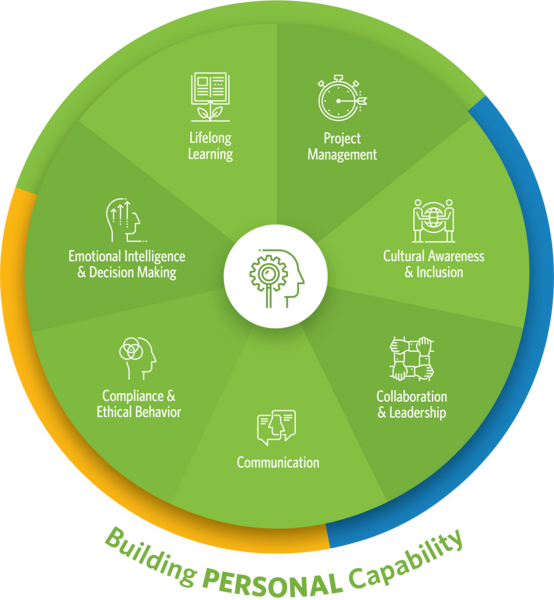ATD Blog
How Post-Grads Can Develop Personal Capabilities
Tue Feb 18 2020

As a recent graduate and new talent development professional, this domain of practice may be the most important as you begin your career. The Developing Personal Capability domain primarily consists of interpersonal skills that working professionals must have to be successful in business. Using the Talent Development Capability Model, recent graduates can model and track their progress as they navigate the changes that are a normal part of the transition from college to the workforce. Here are some ideas for how you can apply these capabilities to your professional development:
Communication: Keep Networking
When starting your career, it is important to continue networking and growing your field of professional connections. Effective communication consists of active listening, facilitating dialogue, and the ability to express thoughts, feelings, and ideas clearly, concisely, and compellingly. Effective communication is key to establishing lasting and meaningful relationships. Follow through with people that you meet and connect with at conferences and events. These relationships will be crucial for your career development and in your personal life.
Emotional Intelligence and Decision Making: Make Time to Reflect
Emotional intelligence is the ability to understand, assess, and regulate your emotions and interpret the verbal and nonverbal behaviors of others. Reflection is a great way to assess your emotions and goals. Even as your life continues to get busy, take time to reflect on your strengths and accomplishments and continue to set short- and long-term goals. You can do this by journaling or taking time to update your resume.
Compliance and Ethical Behavior: Pay Attention During Onboarding
Behaving ethically may seem like a no-brainer, but it is critical that young talent development professionals establish themselves as trustworthy. During your onboarding and throughout your first couple of weeks in a new role, you will likely learn many of the rules and customs of their organization. Understanding and abiding by the policies your organization has established can help you avoid errors and establish personal accountability and integrity.
Lifelong Learning: Have a “Passion Project” or “Side Hustle” Outside of Work
Lifelong learning is fueled by self-motivation and personal curiosity to learn more. It is important to stay curious and keep a sense of wonder to stay connected and engaged. Having many talents and interests helps to make individuals unique and dynamic. When you get a new job, your new role can quickly consume most of your time and energy. However, it is important to continue pursuing your passions and interests outside of work. I was a rower in college, and now I coach a rowing team when I am not working. Other post-graduate friends of mine have pursued freelance photography, podcasting, and other hobbies to contribute to their skills and interests. This can help to develop a more dynamic skill set and practice skills you may not get to utilize at this point in your career. Passion projects can be a great way to continue to meet new people and can be a good way to make extra money.
Project Management: Establish a System to Stay Organized
To ensure you meet all deadlines on projects and other tasks you are involved in, it’s important to stay organized and one step ahead of all the tasks you are responsible for. Whether it’s keeping a bullet journal or a to-do list, or setting alerts on your computer’s calendar, it is important to stick to a system that works for you. This will allow you to be a more effective and trustworthy team member.
Cultural Awareness and Inclusion: Don’t Fall Into Silos
When you land a new role, you often work with the same people within your department. Make sure you meet others outside your department. This can be as simple as walking over to someone’s desk and introducing yourself, or making conversation with people at company gatherings. Companies are made of unique and dynamic people that have different skills and rolls. Take time to meet others and try to learn from the strengths they offer. Cultural awareness and inclusion means embodying an inclusive work environment that is respectful of different cultures, beliefs, customs, and norms. By including others, you can learn from new ideas and capabilities.
Collaboration and Leadership: Establish Trust in the Company and Culture
When you are new to the workforce, the idea of being a leader may seem intimidating. However, leadership is about vision, influence, and aligning with the organization’s strategy. You don’t need to be with an organization long to begin to have an influence and make meaningful connections with others on the team. To establish trust in the company and culture, it is important to establish trust in the people you work with. This can be done by building respectful relationships and communication and providing constructive feedback to others.
